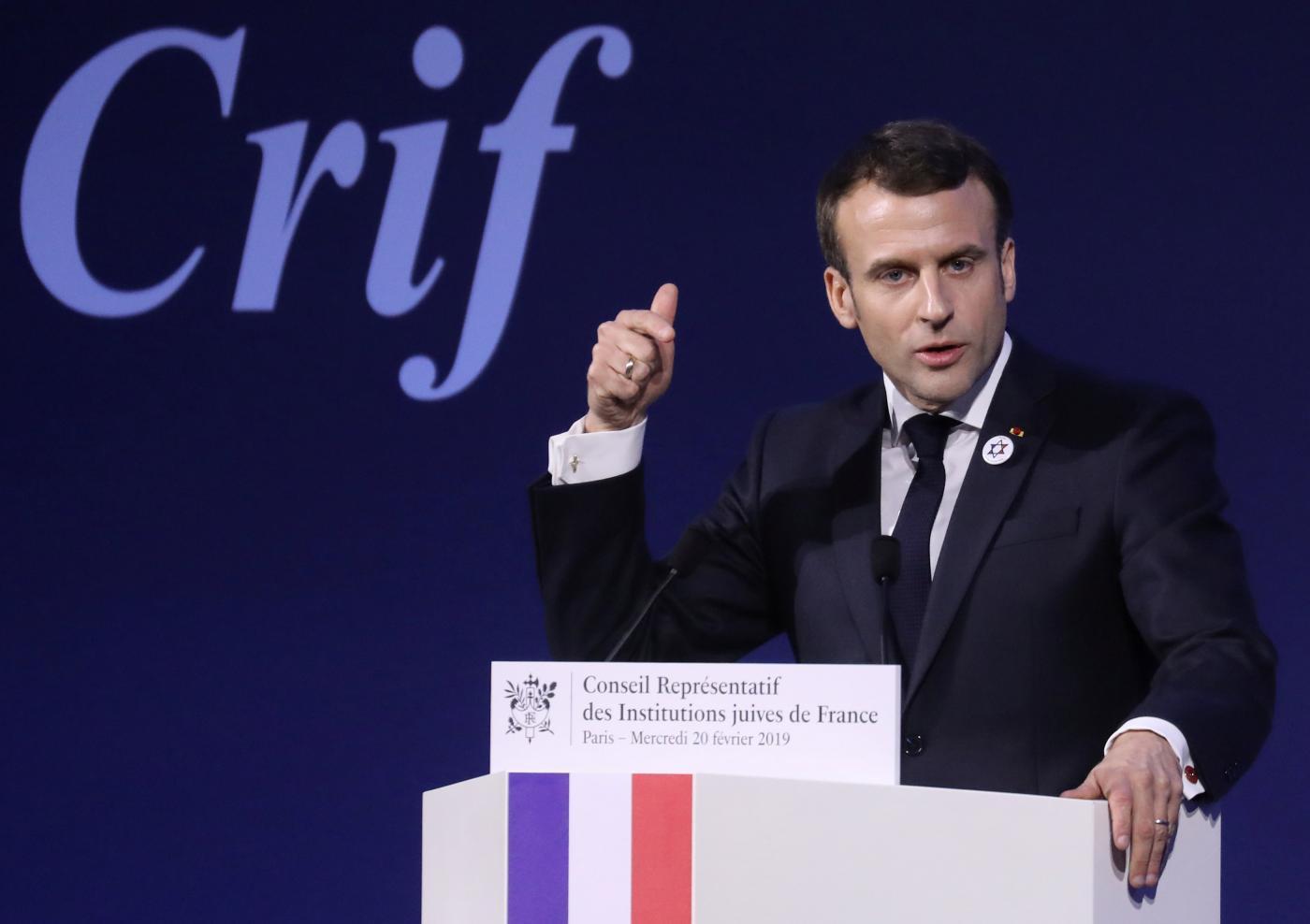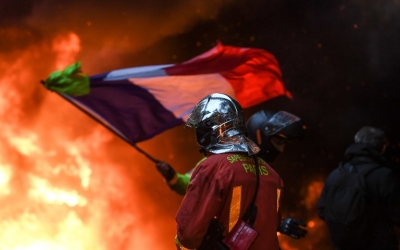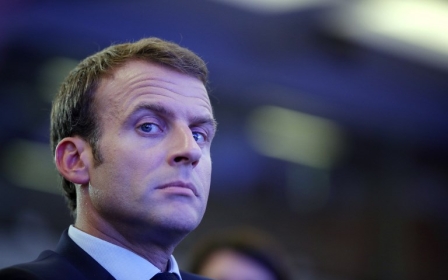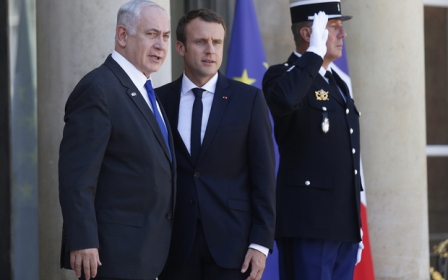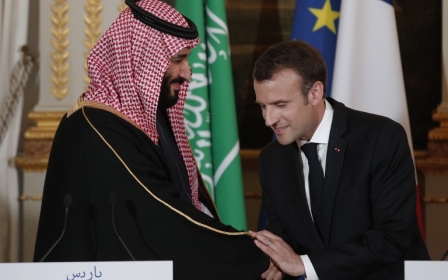French anti-semitism: Macron's tool to silence Palestinian solidarity
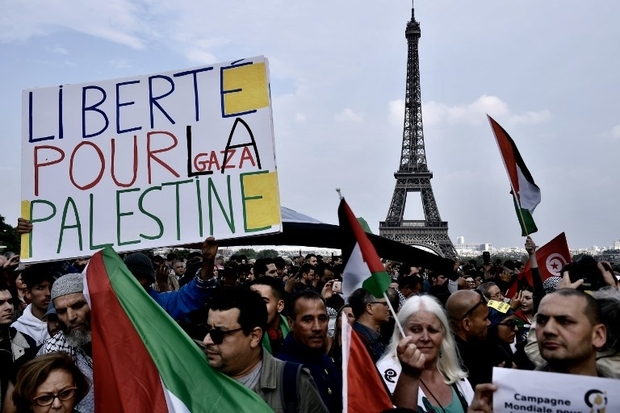
French President Emmanuel Macron has committed himself to making anti-Zionism illegal, by making it – legally – equivalent to anti-semitism, and therefore a hate crime.
This announcement follows a verbal attack against French pro-Israeli writer Alain Finkielkraut during a Gilets Jaunes protest, where one demonstrator hurled the words “dirty Zionist”. The confrontation was described as anti-semitic by the president and numerous commentators.
A Jewish cemetery was also vandalised this month with Nazi swastikas, with around 80 graves targeted in the eastern French village of Quatzenheim, while a portrait of French Holocaust survivor Simone Veil was defaced with Nazi imagery.
Targeting political movements
The alarming rise of anti-semitism has plagued not just France, but the whole continent, with far-right groups gaining ground electorally and on the streets. In France alone, anti-Jewish attacks have risen by 74 percent over the last year.
New MEE newsletter: Jerusalem Dispatch
Sign up to get the latest insights and analysis on Israel-Palestine, alongside Turkey Unpacked and other MEE newsletters
But the problem with the French state’s response – which is not dissimilar to that of other governments, including the UK and US – is that it targets legitimate political movements, rather than dealing with a form of oppression woven into the fabric of French institutions.
It is striking that it is not the far-right and its numerous splinter groups that are being targeted by the president, nor is it the growing normalisation of racist rhetoric, including by the French leader himself.
Racism and fascism are structural forms of oppression that only manifest themselves on the streets because they have been normalised through state institutions
Instead, it is solidarity with the Palestinian people and opposition to Zionism – the ideology that justifies their dispossession – that is made to bear the responsibility.
Macron is showing us exactly what not to do in the face of rising fascism. He is effectively co-opting the rise in anti-semitism to target political dissent in the vein of pro-Palestine, anti-Zionist efforts.
Racism and fascism are structural forms of oppression that only manifest themselves on the streets because they have been legitimised, defused and normalised through state institutions.
Macron is surely aware that in World War Two, anti-semitism, and the consequent dehumanisation of entire peoples, became so widespread only because the Nazi party’s rhetoric gained influence within political institutions.
White-washing history
It is especially rich that Macron is attempting to equate anti-Zionism and anti-semitism when, just a few months ago, he came under fire for defending plans to pay tribute to Nazi collaborator Philippe Petain. Indeed, he claimed it to be legitimate because Petain was a marshal who led the French army to victory a century ago.
While heading the Vichy government, however, Petain and his administration facilitated the deportation to death camps of thousands of Jews. Much of this was later white-washed, with those involved integrated into the postwar administration of the republic.
The state’s targeting of the entire Gilets Jaunes movement over an isolated incident also discredits efforts to fight racism. The movement, which is non-hierarchical and has been described as leaderless, also includes far-right protesters – a point of much internal political debate in recent months. Anti-racist groups have expressed the need to fight for an inclusive and intersectional space, which is only likely to happen if they are part of the political events, protests and rallies.
There is a recognition at the grassroots level that in a society plagued by racism, it is only normal that even in anti-austerity efforts and among left-wing organisations, reactionary and conservative ideas exist. The difference is that there is a willingness to partake in a process of consciousness-raising, to set the direction of the movement and roll back the growing dominance of racism across French society.
The juxtaposition couldn’t be starker. Anti-racists in France are participating in a mass movement against austerity and taking on reactionary ideas, while the president, who himself has a poor track record on racism, is attempting to capitalise on it to launch a broader assault on solidarity with the Palestinian people.
Cosying up to the far-right
Communities are fearful for their safety. To provide the false illusion that Macron and his counterparts in the UK and US are legislating a fight back is despicable. They are targeting groups with a long-standing history of anti-racism, because they’re also likely to support the anti-imperialist struggle against Israel’s occupation of Palestine.
At the same time, these very same politicians are cosying up to the anti-semitic Hungarian government, the far-right, and individuals such as former White House strategist Steve Bannon. They are putting Jewish communities at risk, while instrumentalising them to justify their attacks on the left and communities of colour, and their foreign policies in the Middle East.
In Britain, we have witnessed the targeting of pro-Palestine efforts through counter-terrorism strategies, including Prevent. This has led to the cancellation of events, the questioning and demonisation of young activists, and threats to make the boycott, divestment and sanctions (BDS) movement illegal.
In the US, there’s a continued targeting of activists and public figures by groups such as the Canary Mission. The recent swearing-in of Congress representatives Ilhan Omar and Rashida Tlaib was followed by a media onslaught over their support for Palestinian liberation – not to mention the Middle East security bill voted through the US Senate in order to criminalise BDS.
The need to resist
The international pattern is clear. Around the world, the rich and powerful are stoking racism to divert anger about growing inequality and injustice, including the normalisation of far-right groups, individuals and governments. In this process, anti-semitism is re-emerging, including among the very people who are close to power.
Today, the struggle against anti-Zionism is justified by a false conflation with anti-semitism
Yet, it is the left – the pro-Palestine movement and communities of colour – who are being accused by those very same governments around the world.
Today, the struggle against anti-Zionism, justified by a false conflation with anti-semitism, has a triple purpose: to weaken the left at home, shield the government from criticism over its active participation in the rise of anti-semitism and other forms of racism, and hide its geopolitical support for Israel behind a supposed protection for Jewish communities, endangering them in the process. All three aspects should be resisted ferociously.
The views expressed in this article belong to the author and do not necessarily reflect the editorial policy of Middle East Eye.
Middle East Eye delivers independent and unrivalled coverage and analysis of the Middle East, North Africa and beyond. To learn more about republishing this content and the associated fees, please fill out this form. More about MEE can be found here.



